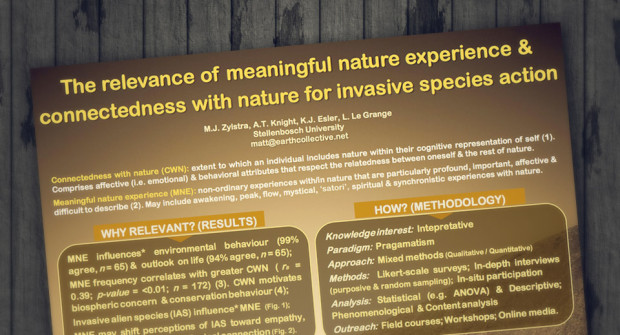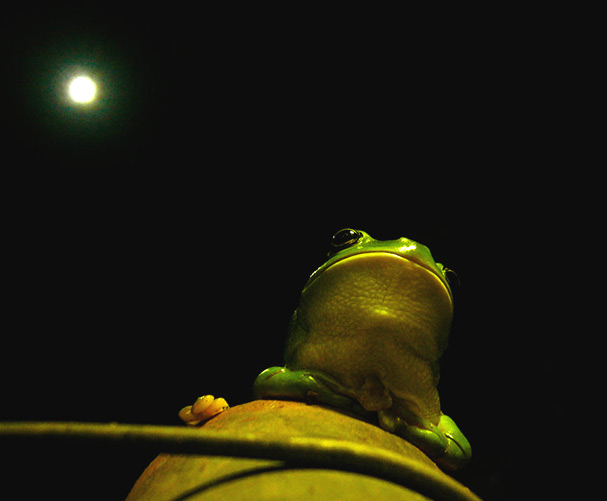I recently presented a relevant selection of research results at the 2012 Annual Research Meeting of the DST-NRF Centre of Excellence for Invasion Biology (C•I•B). The C•I•B has provided three years of funding for my research.
Students were required to prepare a poster and then deliver a one minute background presentation of their research to cover: 1. why it is important and interesting; 2. methods used; and 3. key findings, i.e. take home message. In other words, why, how and so what? This was approach was designed to fit the ‘big picture’ aims of the meeting for ensuring C•I•B’s programme of work has impact.
One minute is lean at the best of times so it was especially challenging to try and cover an interdisciplinary topic such as connectedness and meaningful nature experiences which doesn’t easily fit within C•I•B’s largely natural sciences grounding. One must assume the audience has a certain amount of background knowledge in order to be able to devote time to the results.
I was last presenter of the day (my surname doesn’t always do me favours) and, based on my research findings, conveyed three core messages:
- The presence of invasive alien species (IAS) may undermine and/or adversely affect key variables which make meaningful nature experiences (MNEs) what they are;
- Perversely, IAS may themselves be the subject of MNEs and this may deliver unexpected outcomes which may not always align with short-term conservation aims.
- MNEs appear to play a pivotal role in moving us out of modes of disconnectedness and toward more connected states of being and doing.
These findings and more are summarized in the poster displayed at the meeting and can be downloaded here.
Note that this poster only covers results from one of my three PhD research questions, i.e. the question concerning the impact IAS on MNE and vice versa.
One of the themes to emerge from my findings is the impact of language and how this may affect connectedness with nature. This militarization of language in invasion biology and in managing alien/exotic species has been written about by a number of other authors (e.g. Larsen 2005; Richardson et al. 2008; Simberloff 2012). Such language may include terms such as: ‘war against weeds’, ‘novel weapons’, ‘battle’, ‘first line of defence’, ‘search & destroy’, ‘early warning rapid response’ etc.
Since we rarely reflect on our choice of words, particularly when it becomes an embedded part of our ‘linguistic machinery’, it is worthwhile considering when, where and with whom we use such terminology and if there are any unintended consequences in doing so.
When it comes to fostering connectedness with nature, I believe such language is not only volatile but may perpetuate the perceptual divide between humans and the rest of nature.
References:
-
Larson, B. M. H. 2005. The war of the roses: demilitarizing invasion biology. Frontiers in Ecology and the Environment 3:495.
-
Murray, S.-A. 2005. Working for Water’s “AlienBusters”: material and metaphoric campaigns against “alien invaders”. Critical Arts 19:127–149.
-
Richardson, D. M., P. Pysek, D. Simberloff, M. Rejmanek, and A. D. Mader. 2008. Biological invasions – the widening debate: a response to Charles Warren. Progress in Human Geography 32:295–298.
-
Rotherham, D., and R. A. Lambert. 2011. Invasive and introduced plants and animals: human perceptions, attitudes and approaches to management. (D. Rotherham and R. A. Lambert, Eds.). Earthscan, London.
-
Simberloff, D. 2003. Confronting introduced species: a form of xenophobia ? Biological Invasions 5:179–192.
-
Simberloff, D. 2006. Invasional meltdown six years later – important phenomenon, unfortunate metaphor, or both? Ecology Letters 8:912–919.
-
Simberloff, D. 2012. Nature, natives, nativism, and management: worldviews underlying controversies in invasion biology. Environmental Ethics 19:5–25.











Be the first to share a comment